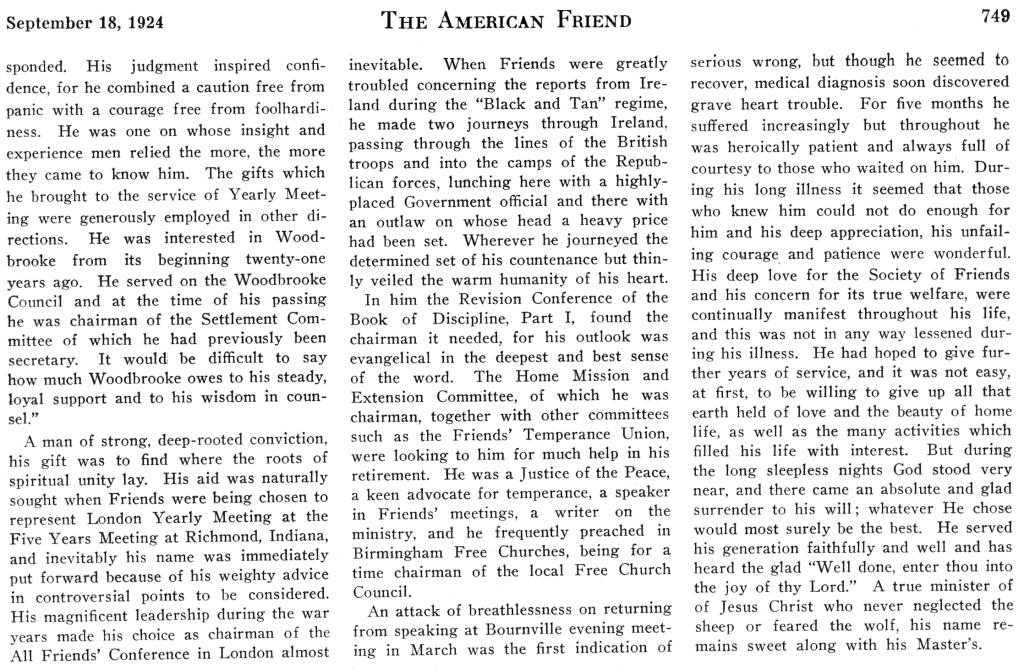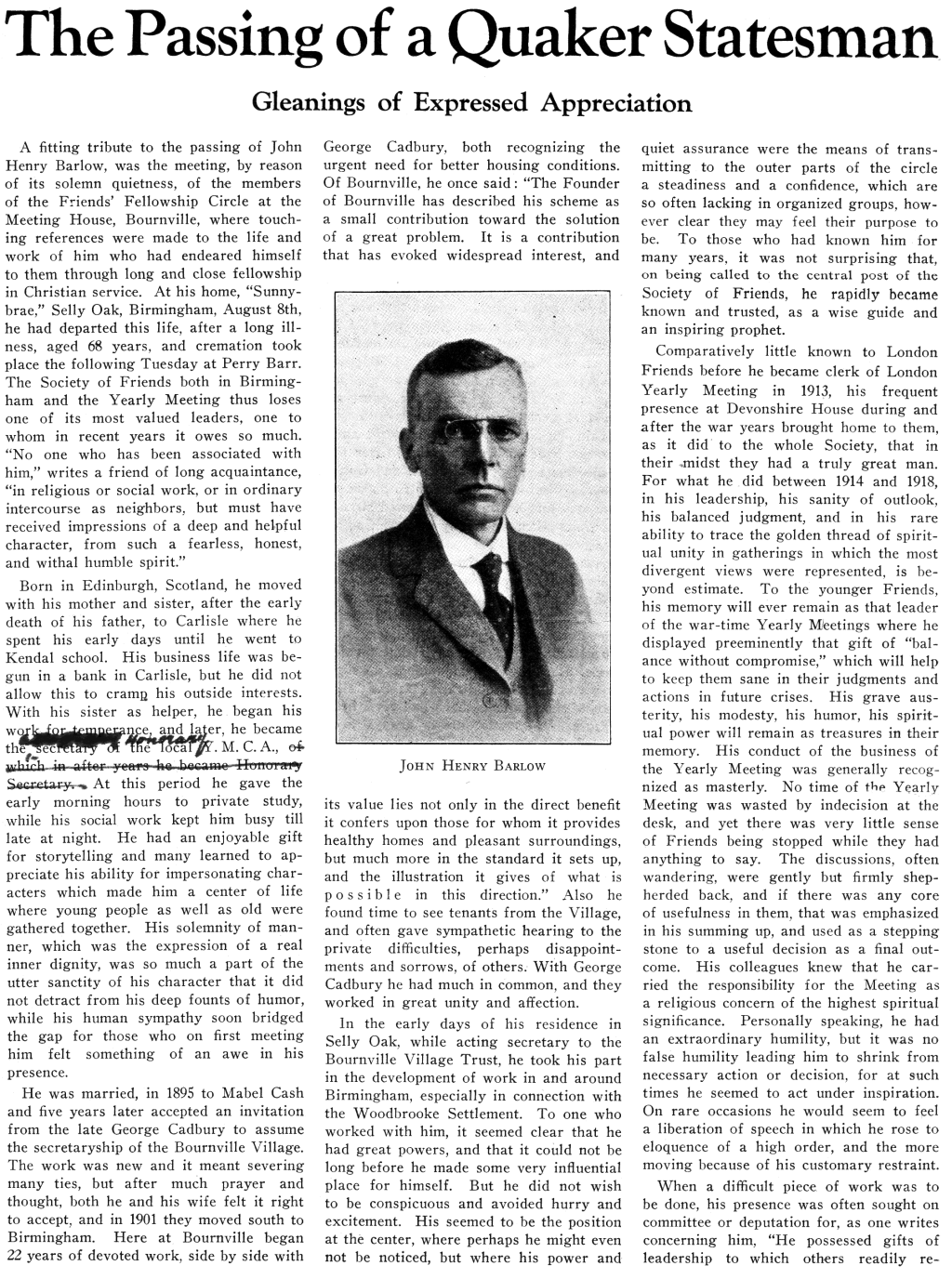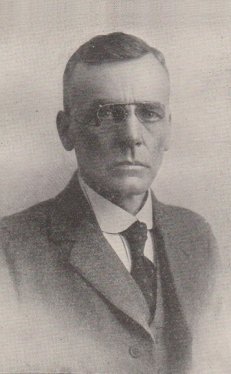

A fitting tribute to the passing of John
Henry Barlow, was the meeting, by reason
of its solemn quietness, of the members of
the Friends' Fellowship Circle at the
Meeting House, Bournville, where touching
references were made to the life and work
of him who had endeared himself to them
through long and close fellowship in
Christian service. At his home,
"Sunnybrae," Selly Oak, Birmingham,
August 8th, he had departed this life, after a
long illness, aged 68 years, and cremation
took place the following Tuesday at Perry
Barr. The Society of Friends both in
Birmingham and the Yearly Meeting thus
loses one of its most valued leaders, one to
whom in recent years it owes so much. "No
one who has been associated with him,"
writes a friend of long acquaintance, "in
religious or social work, or in ordinary
intercourse as neighbors, but must have
received impressions of a deep and helpful
character, from such a fearless, honest, and
withal humble spirit."
Born in Edinburgh, Scotland, he moved
with his mother and sister, after the
early-death of his father, to Carlisle where
he spent his early days until he went to
Kendal School. His business life was begun
in a bank in Carlisle, but he did not allow
this to cramp his outside interests. With his
sister as helper, he began his work for
temperance, and later, he
became the secretary ot hte local Y.M.C.A.
At this period he gave
the early morning hours to private study,
while his social work kept him busy till late
at night. He had an enjoyable gift for
storytelling and many learned to appreciate
his ability for impersonating characters
which made him a center of life where
young people as well as old were gathered
together. His solemnity of manner, which
was the expression of a real inner dignity,
was so much a part of the utter sanctity of
his character that it did not detract from his
deep founts of humor, while his human
sympathy soon bridged the gap for those
who on first meeting him felt something of
an awe in his presence.
He was married, in 1895 to Mabel Cash and
five years later accepted an invitation from
the late George Cadbury to assume the
secretaryship of the Bournville Village. The
work was new and it meant severing many
ties, but after much prayer and thought, both
he and his wife felt it right to accept, and in
1901 they moved south to Birmingham.
Here at Bournville began 22 years of
devoted work, side by side with
George Cadbury, both recognizing the
urgent need for better housing conditions.
Of Bournville, he once said: "The Founder
of Bournville has described his scheme as a
small contribution toward the solution of a
great problem. It is a contribution that has
evoked widespread interest, and
its value lies not only in the direct benefit it
confers upon those for whom it provides
healthy homes and pleasant surroundings,
but much more in the standard it sets up,
and the illustration it gives of what is
possible in this direction." Also he found
time to see tenants from the Village, and
often gave sympathetic hearing to the
private difficulties, perhaps
disappointments and sorrows, of others.
With George Cadbury he had much in
common, and they worked in great unity
and affection.
In the early days of his residence in Selly
Oak, while acting secretary to the
Bournville Village Trust, he took his part in
the development of work in and around
Birmingham, especially in connection with
the Woodbrooke Settlement. To one who
worked with him, it seemed clear that he
had great powers, and that it could not be
long before he made some very influential
place for himself. But he did not wish to be
conspicuous and avoided hurry and
excitement. His seemed to be the position at
the center, where perhaps he might even not
be noticed, but where his power and
quiet assurance were the means of
transmitting to the outer parts of the circle a
steadiness and a confidence, which are so
often lacking in organized groups, however
clear they may feel their purpose to be. To
those who had known him for many years,
it was not surprising that, on being called to
the central post of the
Society of Friends, he rapidly became
known and trusted, as a wise guide and an
inspiring prophet.
Comparatively little known to London
Friends before he became clerk of London
Yearly Meeting in 1913, his frequent
presence at Devonshire House during and
after the war years brought home to them,
as it did to the whole Society, that in their
midst they had a truly great man. For what
he did between 1914 and 1918, in his
leadership, his sanity of outlook, his
balanced judgment, and in his rare ability to
trace the golden thread of spiritual unity in
gatherings in which the most divergent
views were represented, is beyond estimate.
To the younger Friends, his memory will
ever remain as that leader of the war-time
Yearly Meetings where he displayed
preeminently that gift of "balance without
compromise," which will help to keep them
sane in their judgments and actions in future
crises. His grave austerity, his modesty, his
humor, his spiritual power will remain as
treasures in their memory. His conduct of
the business of the Yearly Meeting was
generally recognized as masterly. No
time of thp Yearly Meeting was wasted by
indecision at the desk, and yet there was
very little sense of Friends being stopped
while they had anything to say. The
discussions, often wandering, were gently
but firmly shepherded back, and if there
was any core of usefulness in them, that was
emphasized in his summing up, and used as
a stepping stone to a useful decision as a
final outcome. His colleagues knew that he
carried the responsibility for the Meeting as
a religious concern of the highest spiritual
significance. Personally speaking, he had an
extraordinary humility, but it was no false
humility leading him to shrink from
necessary action or decision, for at such
times he seemed to act under inspiration.
On rare occasions he would seem to feel a
liberation of speech in which he rose to
eloquence of a high order, and the more
moving because of his customary restraint.
When a difficult piece of work was to be
done, his presence was often sought on
committee or deputation for, as one writes
concerning him, "He possessed gifts of
leadership to which others readily
responded. His judgment inspired confidence,
for he combined a caution free from panic
with a courage free from foolhardiness. He
was one on whose insight and experience
men relied the more, the more they came to
know him. The gifts which he brought to
the service of Yearly Meeting were
generously employed in other directions. He
was interested in Woodbrooke from its
beginning twenty-one years ago. He served
on the Woodbrooke Council and at the time
of his passing he was chairman of the
Settlement Committee of which he had
previously been secretary. It would be
difficult to say how much Woodbrooke
owes to his steady, loyal support and to his
wisdom in counsel."
A man of strong, deep-rooted conviction,
his gift was to find where the roots of
spiritual unity lay. His aid was naturally
sought when Friends were being chosen to
represent London Yearly Meeting at the
Five Years Meeting at Richmond, Indiana,
and inevitably his name was immediately
put forward because of his weighty advice
in controversial points to be considered. His
magnificent leadership during the war years
made his choice as chairman of the All
Friends' Conference in London almost
inevitable. When Friends were greatly
troubled concerning the reports from Ireland
during the "Black and Tan" regime, he
made two journeys through Ireland, passing
through the lines of the British troops and
into the camps of the Republican forces,
lunching here with a highly-placed
Government official and there with an
outlaw on whose head a heavy price had
been set. Wherever he journeyed the
determined set of his countenance but thinly
veiled the warm humanity of his heart.
In him the Revision Conference of the Book of
Discipline, Part I, found the chairman it
needed, for his outlook was evangelical in
the deepest and best sense of the word. The
Home Mission and Extension Committee,
of which he was chairman, together with
other committees such as the Friends'
Temperance Union, were looking to him
for much help in his retirement. He was a
Justice of the Peace, a keen advocate for
temperance, a speaker in Friends' meetings,
a writer on the ministry, and he frequently
preached in Birmingham Free Churches,
being for a time chairman of the local Free
Church Council.
An attack of breathlessness on returning
from speaking at Bournville evening
meeting in March was the first indication of
serious wrong, but though he seemed to
recover, medical diagnosis soon discovered
grave heart trouble. For five months he
suffered increasingly but throughout he was
heroically patient and always full of
courtesy to those who waited on him.
During his long illness it seemed that those
who knew him could not do enough for him
and his deep appreciation, his unfailing
courage and patience were wonderful. His
deep love for the Society of Friends and his
concern for its true welfare, were
continually manifest throughout his life, and
this was not in any way lessened during his
illness. He had hoped to give further years
of service, and it was not easy, at first, to be
willing to give up all that earth held of love
and the beauty of home life, as well as the
many activities which filled his life with
interest. But during the long sleepless nights
God stood very near, and there came an
absolute and glad surrender to his will;
whatever He chose would most surely be
the best. He served his generation faithfully
and well and has heard the glad "Well done,
enter thou into the joy of thy Lord." A true
minister of of Jesus Christ who never
neglected the sheep or feared the wolf, his
name remains sweet along with his
Master's.
Eulogy by the editor in the same edition of The American Friend.
•
More John Henry Barlow
resources.

